UNCC100 Assignment: Analysis of Catholic Social Thought Principles
VerifiedAdded on 2022/09/18
|6
|1745
|15
Report
AI Summary
This feature article delves into the core principles of Catholic Social Thought (CST), including the life and dignity of the human person, the common good, the preferential option for the poor, global solidarity, and the universal purpose of goods. The article explains each principle, highlighting their significance in fostering a just and holistic community. It emphasizes the importance of respecting human life, working for the benefit of society, aiding the underprivileged, and recognizing the interconnectedness of all people. The author connects these principles to their profession, emphasizing how CST can promote educational equality and create a more empathetic and tolerant society. The article concludes by underscoring the relevance of CST for all professions in cultivating a holistic understanding of life and a commitment to the common good. References from various academic journals support the analysis, providing a comprehensive overview of CST's relevance.
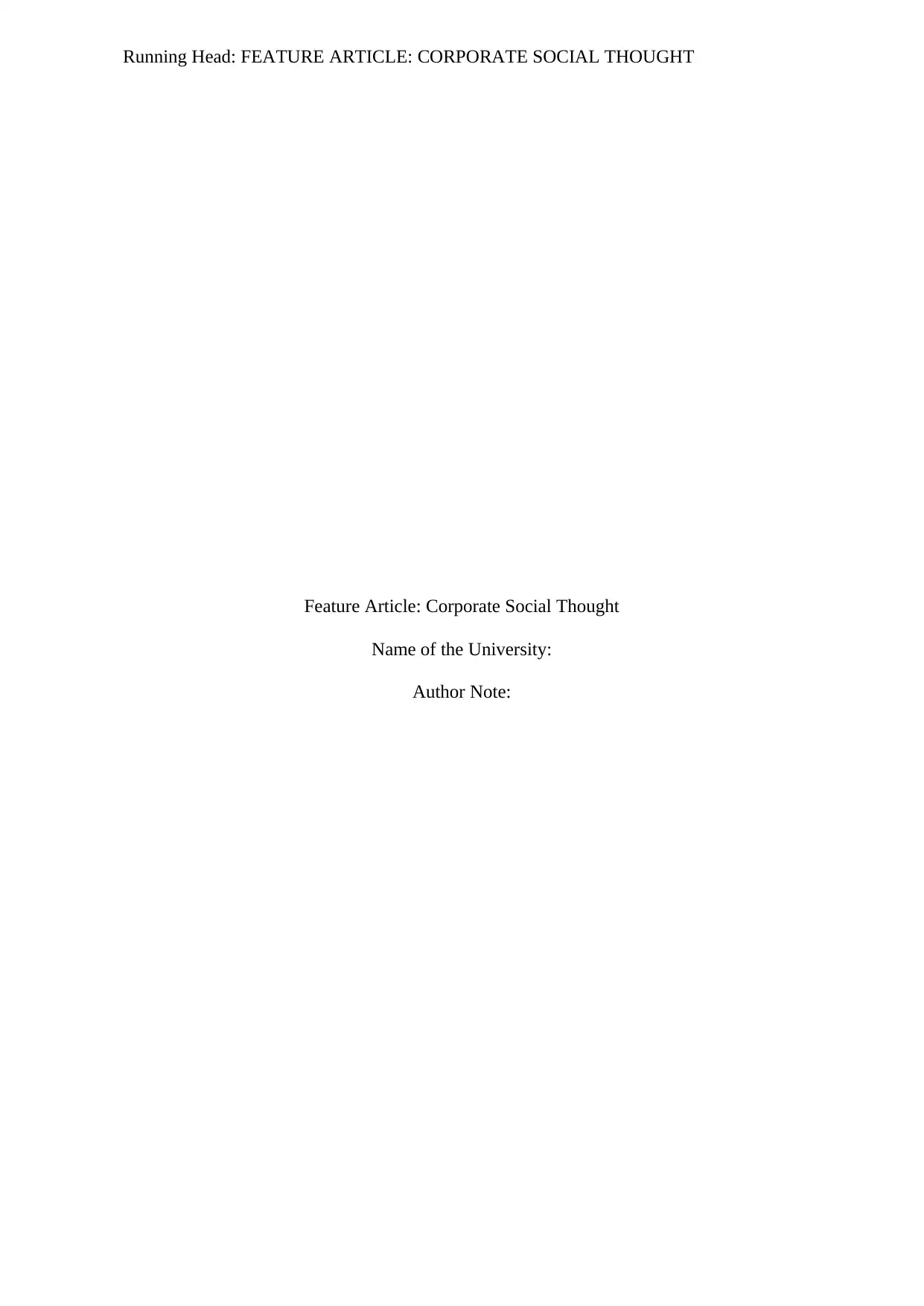
Running Head: FEATURE ARTICLE: CORPORATE SOCIAL THOUGHT
Feature Article: Corporate Social Thought
Name of the University:
Author Note:
Feature Article: Corporate Social Thought
Name of the University:
Author Note:
Paraphrase This Document
Need a fresh take? Get an instant paraphrase of this document with our AI Paraphraser
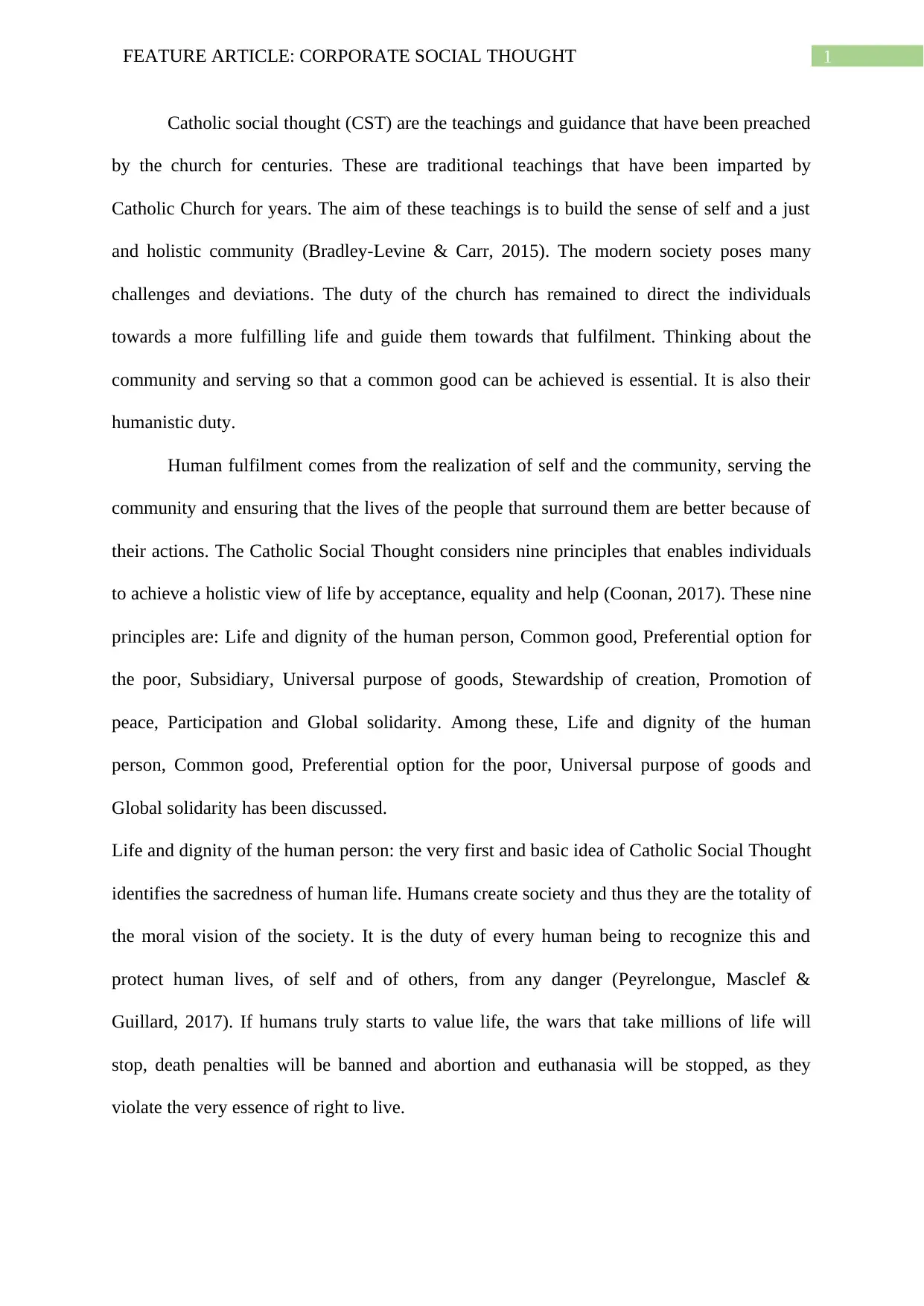
1FEATURE ARTICLE: CORPORATE SOCIAL THOUGHT
Catholic social thought (CST) are the teachings and guidance that have been preached
by the church for centuries. These are traditional teachings that have been imparted by
Catholic Church for years. The aim of these teachings is to build the sense of self and a just
and holistic community (Bradley-Levine & Carr, 2015). The modern society poses many
challenges and deviations. The duty of the church has remained to direct the individuals
towards a more fulfilling life and guide them towards that fulfilment. Thinking about the
community and serving so that a common good can be achieved is essential. It is also their
humanistic duty.
Human fulfilment comes from the realization of self and the community, serving the
community and ensuring that the lives of the people that surround them are better because of
their actions. The Catholic Social Thought considers nine principles that enables individuals
to achieve a holistic view of life by acceptance, equality and help (Coonan, 2017). These nine
principles are: Life and dignity of the human person, Common good, Preferential option for
the poor, Subsidiary, Universal purpose of goods, Stewardship of creation, Promotion of
peace, Participation and Global solidarity. Among these, Life and dignity of the human
person, Common good, Preferential option for the poor, Universal purpose of goods and
Global solidarity has been discussed.
Life and dignity of the human person: the very first and basic idea of Catholic Social Thought
identifies the sacredness of human life. Humans create society and thus they are the totality of
the moral vision of the society. It is the duty of every human being to recognize this and
protect human lives, of self and of others, from any danger (Peyrelongue, Masclef &
Guillard, 2017). If humans truly starts to value life, the wars that take millions of life will
stop, death penalties will be banned and abortion and euthanasia will be stopped, as they
violate the very essence of right to live.
Catholic social thought (CST) are the teachings and guidance that have been preached
by the church for centuries. These are traditional teachings that have been imparted by
Catholic Church for years. The aim of these teachings is to build the sense of self and a just
and holistic community (Bradley-Levine & Carr, 2015). The modern society poses many
challenges and deviations. The duty of the church has remained to direct the individuals
towards a more fulfilling life and guide them towards that fulfilment. Thinking about the
community and serving so that a common good can be achieved is essential. It is also their
humanistic duty.
Human fulfilment comes from the realization of self and the community, serving the
community and ensuring that the lives of the people that surround them are better because of
their actions. The Catholic Social Thought considers nine principles that enables individuals
to achieve a holistic view of life by acceptance, equality and help (Coonan, 2017). These nine
principles are: Life and dignity of the human person, Common good, Preferential option for
the poor, Subsidiary, Universal purpose of goods, Stewardship of creation, Promotion of
peace, Participation and Global solidarity. Among these, Life and dignity of the human
person, Common good, Preferential option for the poor, Universal purpose of goods and
Global solidarity has been discussed.
Life and dignity of the human person: the very first and basic idea of Catholic Social Thought
identifies the sacredness of human life. Humans create society and thus they are the totality of
the moral vision of the society. It is the duty of every human being to recognize this and
protect human lives, of self and of others, from any danger (Peyrelongue, Masclef &
Guillard, 2017). If humans truly starts to value life, the wars that take millions of life will
stop, death penalties will be banned and abortion and euthanasia will be stopped, as they
violate the very essence of right to live.
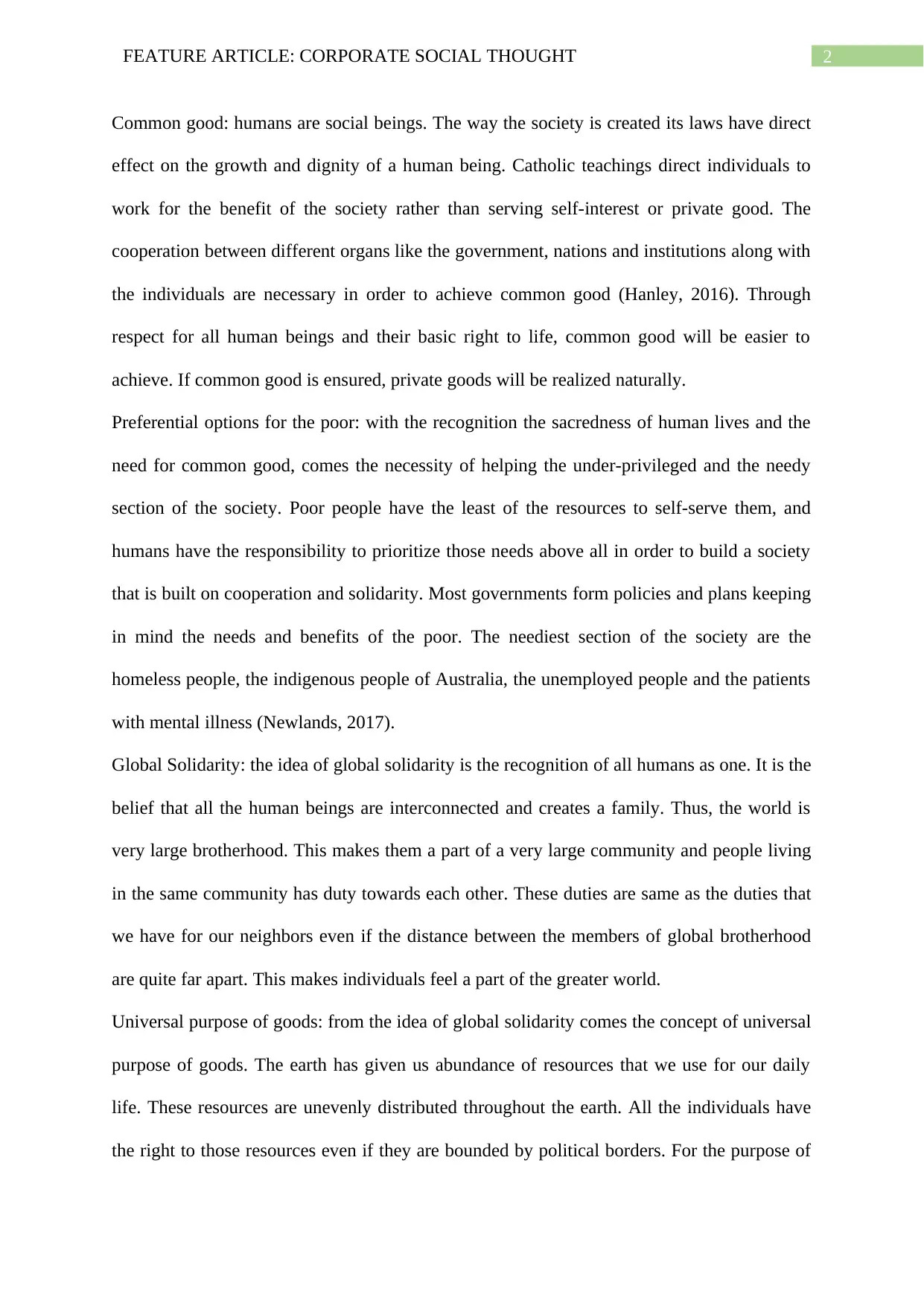
2FEATURE ARTICLE: CORPORATE SOCIAL THOUGHT
Common good: humans are social beings. The way the society is created its laws have direct
effect on the growth and dignity of a human being. Catholic teachings direct individuals to
work for the benefit of the society rather than serving self-interest or private good. The
cooperation between different organs like the government, nations and institutions along with
the individuals are necessary in order to achieve common good (Hanley, 2016). Through
respect for all human beings and their basic right to life, common good will be easier to
achieve. If common good is ensured, private goods will be realized naturally.
Preferential options for the poor: with the recognition the sacredness of human lives and the
need for common good, comes the necessity of helping the under-privileged and the needy
section of the society. Poor people have the least of the resources to self-serve them, and
humans have the responsibility to prioritize those needs above all in order to build a society
that is built on cooperation and solidarity. Most governments form policies and plans keeping
in mind the needs and benefits of the poor. The neediest section of the society are the
homeless people, the indigenous people of Australia, the unemployed people and the patients
with mental illness (Newlands, 2017).
Global Solidarity: the idea of global solidarity is the recognition of all humans as one. It is the
belief that all the human beings are interconnected and creates a family. Thus, the world is
very large brotherhood. This makes them a part of a very large community and people living
in the same community has duty towards each other. These duties are same as the duties that
we have for our neighbors even if the distance between the members of global brotherhood
are quite far apart. This makes individuals feel a part of the greater world.
Universal purpose of goods: from the idea of global solidarity comes the concept of universal
purpose of goods. The earth has given us abundance of resources that we use for our daily
life. These resources are unevenly distributed throughout the earth. All the individuals have
the right to those resources even if they are bounded by political borders. For the purpose of
Common good: humans are social beings. The way the society is created its laws have direct
effect on the growth and dignity of a human being. Catholic teachings direct individuals to
work for the benefit of the society rather than serving self-interest or private good. The
cooperation between different organs like the government, nations and institutions along with
the individuals are necessary in order to achieve common good (Hanley, 2016). Through
respect for all human beings and their basic right to life, common good will be easier to
achieve. If common good is ensured, private goods will be realized naturally.
Preferential options for the poor: with the recognition the sacredness of human lives and the
need for common good, comes the necessity of helping the under-privileged and the needy
section of the society. Poor people have the least of the resources to self-serve them, and
humans have the responsibility to prioritize those needs above all in order to build a society
that is built on cooperation and solidarity. Most governments form policies and plans keeping
in mind the needs and benefits of the poor. The neediest section of the society are the
homeless people, the indigenous people of Australia, the unemployed people and the patients
with mental illness (Newlands, 2017).
Global Solidarity: the idea of global solidarity is the recognition of all humans as one. It is the
belief that all the human beings are interconnected and creates a family. Thus, the world is
very large brotherhood. This makes them a part of a very large community and people living
in the same community has duty towards each other. These duties are same as the duties that
we have for our neighbors even if the distance between the members of global brotherhood
are quite far apart. This makes individuals feel a part of the greater world.
Universal purpose of goods: from the idea of global solidarity comes the concept of universal
purpose of goods. The earth has given us abundance of resources that we use for our daily
life. These resources are unevenly distributed throughout the earth. All the individuals have
the right to those resources even if they are bounded by political borders. For the purpose of
⊘ This is a preview!⊘
Do you want full access?
Subscribe today to unlock all pages.

Trusted by 1+ million students worldwide
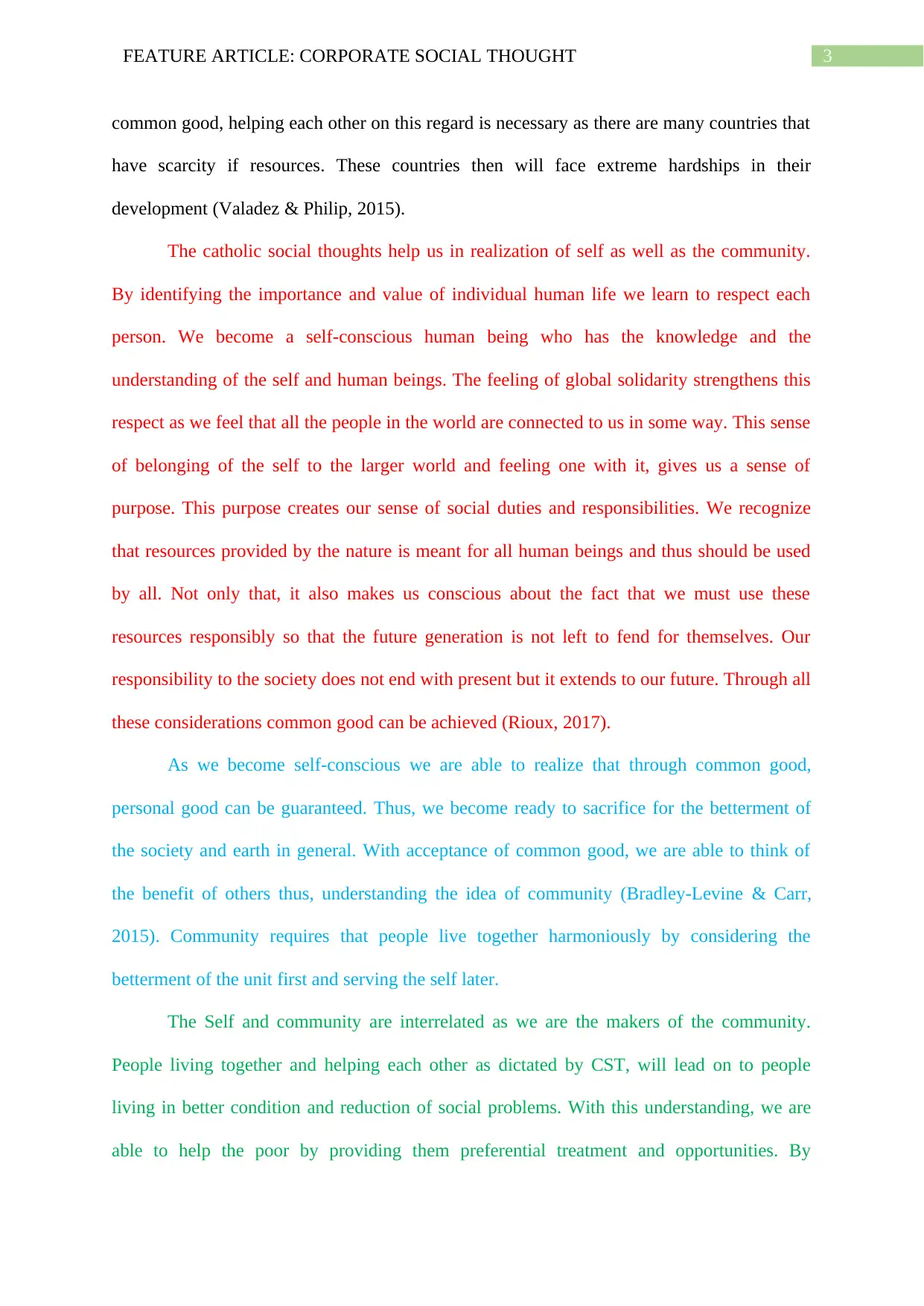
3FEATURE ARTICLE: CORPORATE SOCIAL THOUGHT
common good, helping each other on this regard is necessary as there are many countries that
have scarcity if resources. These countries then will face extreme hardships in their
development (Valadez & Philip, 2015).
The catholic social thoughts help us in realization of self as well as the community.
By identifying the importance and value of individual human life we learn to respect each
person. We become a self-conscious human being who has the knowledge and the
understanding of the self and human beings. The feeling of global solidarity strengthens this
respect as we feel that all the people in the world are connected to us in some way. This sense
of belonging of the self to the larger world and feeling one with it, gives us a sense of
purpose. This purpose creates our sense of social duties and responsibilities. We recognize
that resources provided by the nature is meant for all human beings and thus should be used
by all. Not only that, it also makes us conscious about the fact that we must use these
resources responsibly so that the future generation is not left to fend for themselves. Our
responsibility to the society does not end with present but it extends to our future. Through all
these considerations common good can be achieved (Rioux, 2017).
As we become self-conscious we are able to realize that through common good,
personal good can be guaranteed. Thus, we become ready to sacrifice for the betterment of
the society and earth in general. With acceptance of common good, we are able to think of
the benefit of others thus, understanding the idea of community (Bradley-Levine & Carr,
2015). Community requires that people live together harmoniously by considering the
betterment of the unit first and serving the self later.
The Self and community are interrelated as we are the makers of the community.
People living together and helping each other as dictated by CST, will lead on to people
living in better condition and reduction of social problems. With this understanding, we are
able to help the poor by providing them preferential treatment and opportunities. By
common good, helping each other on this regard is necessary as there are many countries that
have scarcity if resources. These countries then will face extreme hardships in their
development (Valadez & Philip, 2015).
The catholic social thoughts help us in realization of self as well as the community.
By identifying the importance and value of individual human life we learn to respect each
person. We become a self-conscious human being who has the knowledge and the
understanding of the self and human beings. The feeling of global solidarity strengthens this
respect as we feel that all the people in the world are connected to us in some way. This sense
of belonging of the self to the larger world and feeling one with it, gives us a sense of
purpose. This purpose creates our sense of social duties and responsibilities. We recognize
that resources provided by the nature is meant for all human beings and thus should be used
by all. Not only that, it also makes us conscious about the fact that we must use these
resources responsibly so that the future generation is not left to fend for themselves. Our
responsibility to the society does not end with present but it extends to our future. Through all
these considerations common good can be achieved (Rioux, 2017).
As we become self-conscious we are able to realize that through common good,
personal good can be guaranteed. Thus, we become ready to sacrifice for the betterment of
the society and earth in general. With acceptance of common good, we are able to think of
the benefit of others thus, understanding the idea of community (Bradley-Levine & Carr,
2015). Community requires that people live together harmoniously by considering the
betterment of the unit first and serving the self later.
The Self and community are interrelated as we are the makers of the community.
People living together and helping each other as dictated by CST, will lead on to people
living in better condition and reduction of social problems. With this understanding, we are
able to help the poor by providing them preferential treatment and opportunities. By
Paraphrase This Document
Need a fresh take? Get an instant paraphrase of this document with our AI Paraphraser
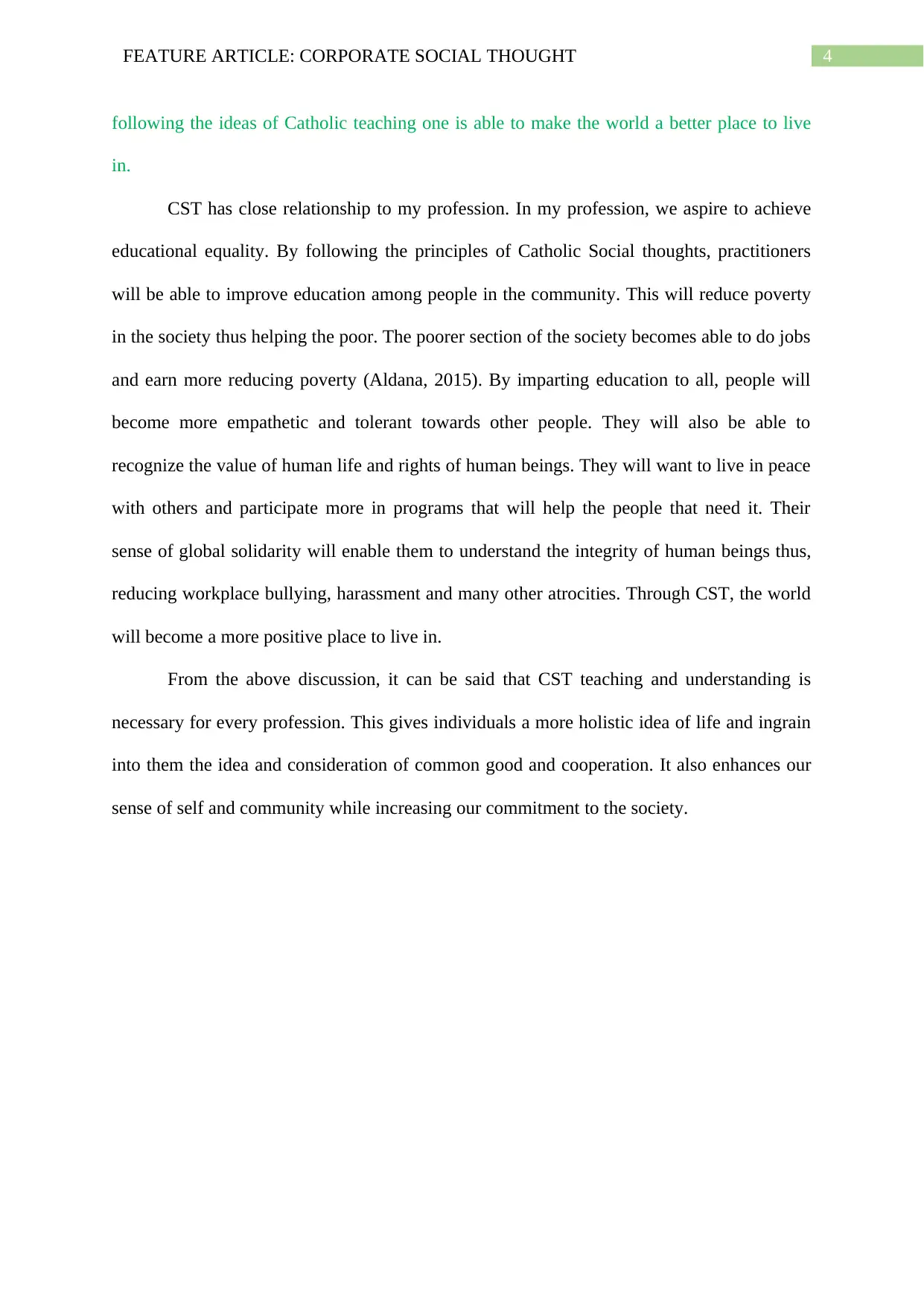
4FEATURE ARTICLE: CORPORATE SOCIAL THOUGHT
following the ideas of Catholic teaching one is able to make the world a better place to live
in.
CST has close relationship to my profession. In my profession, we aspire to achieve
educational equality. By following the principles of Catholic Social thoughts, practitioners
will be able to improve education among people in the community. This will reduce poverty
in the society thus helping the poor. The poorer section of the society becomes able to do jobs
and earn more reducing poverty (Aldana, 2015). By imparting education to all, people will
become more empathetic and tolerant towards other people. They will also be able to
recognize the value of human life and rights of human beings. They will want to live in peace
with others and participate more in programs that will help the people that need it. Their
sense of global solidarity will enable them to understand the integrity of human beings thus,
reducing workplace bullying, harassment and many other atrocities. Through CST, the world
will become a more positive place to live in.
From the above discussion, it can be said that CST teaching and understanding is
necessary for every profession. This gives individuals a more holistic idea of life and ingrain
into them the idea and consideration of common good and cooperation. It also enhances our
sense of self and community while increasing our commitment to the society.
following the ideas of Catholic teaching one is able to make the world a better place to live
in.
CST has close relationship to my profession. In my profession, we aspire to achieve
educational equality. By following the principles of Catholic Social thoughts, practitioners
will be able to improve education among people in the community. This will reduce poverty
in the society thus helping the poor. The poorer section of the society becomes able to do jobs
and earn more reducing poverty (Aldana, 2015). By imparting education to all, people will
become more empathetic and tolerant towards other people. They will also be able to
recognize the value of human life and rights of human beings. They will want to live in peace
with others and participate more in programs that will help the people that need it. Their
sense of global solidarity will enable them to understand the integrity of human beings thus,
reducing workplace bullying, harassment and many other atrocities. Through CST, the world
will become a more positive place to live in.
From the above discussion, it can be said that CST teaching and understanding is
necessary for every profession. This gives individuals a more holistic idea of life and ingrain
into them the idea and consideration of common good and cooperation. It also enhances our
sense of self and community while increasing our commitment to the society.
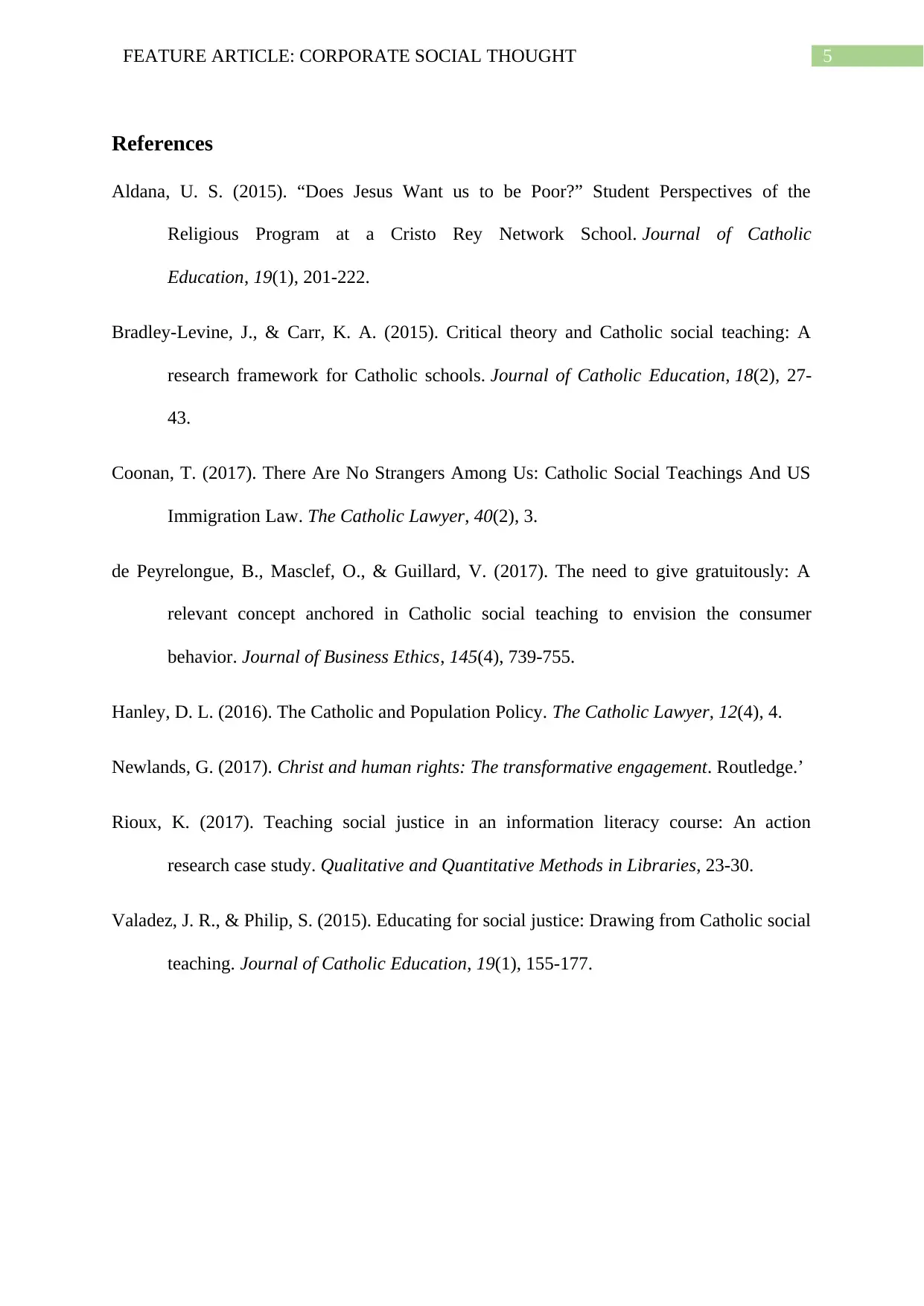
5FEATURE ARTICLE: CORPORATE SOCIAL THOUGHT
References
Aldana, U. S. (2015). “Does Jesus Want us to be Poor?” Student Perspectives of the
Religious Program at a Cristo Rey Network School. Journal of Catholic
Education, 19(1), 201-222.
Bradley-Levine, J., & Carr, K. A. (2015). Critical theory and Catholic social teaching: A
research framework for Catholic schools. Journal of Catholic Education, 18(2), 27-
43.
Coonan, T. (2017). There Are No Strangers Among Us: Catholic Social Teachings And US
Immigration Law. The Catholic Lawyer, 40(2), 3.
de Peyrelongue, B., Masclef, O., & Guillard, V. (2017). The need to give gratuitously: A
relevant concept anchored in Catholic social teaching to envision the consumer
behavior. Journal of Business Ethics, 145(4), 739-755.
Hanley, D. L. (2016). The Catholic and Population Policy. The Catholic Lawyer, 12(4), 4.
Newlands, G. (2017). Christ and human rights: The transformative engagement. Routledge.’
Rioux, K. (2017). Teaching social justice in an information literacy course: An action
research case study. Qualitative and Quantitative Methods in Libraries, 23-30.
Valadez, J. R., & Philip, S. (2015). Educating for social justice: Drawing from Catholic social
teaching. Journal of Catholic Education, 19(1), 155-177.
References
Aldana, U. S. (2015). “Does Jesus Want us to be Poor?” Student Perspectives of the
Religious Program at a Cristo Rey Network School. Journal of Catholic
Education, 19(1), 201-222.
Bradley-Levine, J., & Carr, K. A. (2015). Critical theory and Catholic social teaching: A
research framework for Catholic schools. Journal of Catholic Education, 18(2), 27-
43.
Coonan, T. (2017). There Are No Strangers Among Us: Catholic Social Teachings And US
Immigration Law. The Catholic Lawyer, 40(2), 3.
de Peyrelongue, B., Masclef, O., & Guillard, V. (2017). The need to give gratuitously: A
relevant concept anchored in Catholic social teaching to envision the consumer
behavior. Journal of Business Ethics, 145(4), 739-755.
Hanley, D. L. (2016). The Catholic and Population Policy. The Catholic Lawyer, 12(4), 4.
Newlands, G. (2017). Christ and human rights: The transformative engagement. Routledge.’
Rioux, K. (2017). Teaching social justice in an information literacy course: An action
research case study. Qualitative and Quantitative Methods in Libraries, 23-30.
Valadez, J. R., & Philip, S. (2015). Educating for social justice: Drawing from Catholic social
teaching. Journal of Catholic Education, 19(1), 155-177.
⊘ This is a preview!⊘
Do you want full access?
Subscribe today to unlock all pages.

Trusted by 1+ million students worldwide
1 out of 6
Related Documents
Your All-in-One AI-Powered Toolkit for Academic Success.
+13062052269
info@desklib.com
Available 24*7 on WhatsApp / Email
![[object Object]](/_next/static/media/star-bottom.7253800d.svg)
Unlock your academic potential
Copyright © 2020–2026 A2Z Services. All Rights Reserved. Developed and managed by ZUCOL.





